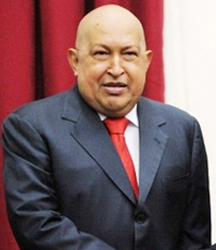CARACAS, (Reuters) – President Hugo Chavez’s cancer ordeal has revived his emotional connection with Venezuela’s masses, meaning opponents will struggle to beat him at next year’s election, a U.S. biographer believes.
Having worked in Venezuela as a reporter then written a well-received 2007 biography “Hugo!,” Bart Jones has a closer perspective than most on the former soldier whose nearly 13-year socialist rule has polarized opinion around the world.
Though in the dark like almost everyone else on the exact nature of Chavez’s illness, Jones, 53, said the saga had breathed new life into his powerful links with the poor.

“It devastated his supporters. They almost felt like they might be left orphans. But it reminded them they have very much an emotional, spiritual connection with Chavez,” said Jones.
“He’s not just a president for his supporters, he’s really more of a mystical, mythical figure, almost like a messiah.”
A sympathy bounce has given Chavez a near 10-point gain to nearly 60 percent in most polls since he had surgery in Cuba in June to remove a malignant tumor then underwent chemotherapy.
“I think if the election was held today, he’d win,” Jones, who works for a U.S. paper, said by telephone from New York.
Chavez, 57, has relied on heart-on-sleeve oratory, huge slum investments and fiery rhetoric to ensure support.
“Largely wiping out illiteracy, putting Cuban doctors in neighborhoods where most Venezuelan doctors in the past would dare not even walk into … It’s not quite the disaster that people internationally tend to think,” Jones said, also noting police reforms and an “explosion” of grassroots organizations.
“INTERNATIONAL BAD BOY”
Rivals have struggled to match Chavez’s formula. Yet opposition parties have achieved unprecedented unity and will now select one candidate for the 2012 presidential poll.
“Perhaps they’re a step above what we’ve seen in the past, but I don’t know if they’re really strong enough to break that link Chavez still has with most Venezuelans,” said Jones.
“He’s got this uncanny ability to read the pulse of the Venezuelan people, or at least the majority poor.”
The opposition suffered from links to a past elite discredited in many Venezuelans’ eyes, and a lack of detailed policies, he said. “I don’t know if they have a clear enough message other than ‘let’s get rid of Hugo Chavez.’“
Jones’ book, subtitled “The Hugo Chavez Story from Mud Hut to Perpetual Revolution,” is a relatively sympathetic portrait of a man critics decry as an old-style autocrat who has stamped on basic freedoms and squandered the OPEC member’s oil wealth.
The author does not, though, romanticize Chavez as some international supporters do — “I do not put him on a pedestal, no, I just want to be fair” — and readily criticized the government’s record on crime, graft and bureaucracy.
“He’s really seen as an international bad boy, which I think is something of a simplification … There’s got to be a reason people still support and vote for him after 12 years. It can’t be that they’re all just crazy and stupid.”
Views of him in America were caricatured, he said. “When I went down to interview him, I was telling a neighbor up here about it after I got back … and she said: ‘Well, are you OK? Did they torture you, kidnap you?’ People have this really distorted view of what’s going on down there. “He’s seen as a brutal, bloodthirsty dictator.”
Jones was taken aback by the impact of Chavez’s cancer.
“He was a very athletic, active guy. So to see that bloated face and bald head is shocking.”
